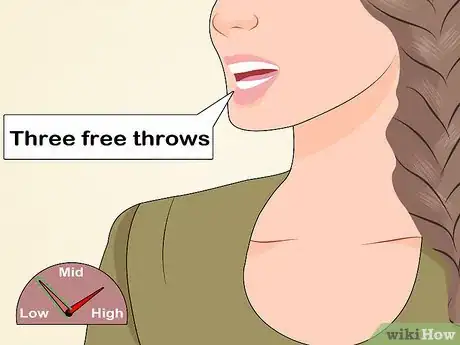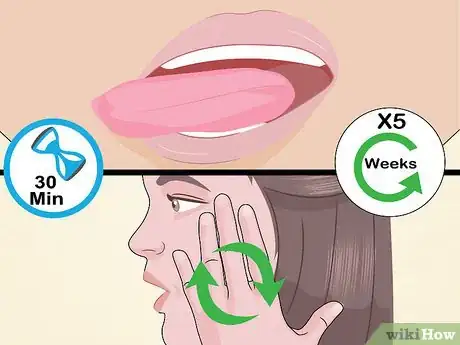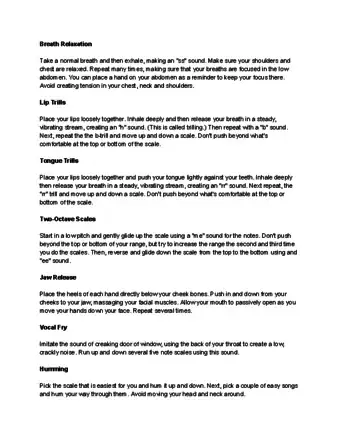This article was co-authored by Patrick Muñoz. Patrick is an internationally recognized Voice & Speech Coach, focusing on public speaking, vocal power, accent and dialects, accent reduction, voiceover, acting and speech therapy. He has worked with clients such as Penelope Cruz, Eva Longoria, and Roselyn Sanchez. He was voted LA's Favorite Voice and Dialect Coach by BACKSTAGE, is the voice and speech coach for Disney and Turner Classic Movies, and is a member of Voice and Speech Trainers Association.
wikiHow marks an article as reader-approved once it receives enough positive feedback. This article received 18 testimonials and 88% of readers who voted found it helpful, earning it our reader-approved status.
This article has been viewed 895,748 times.
If your profession requires you to speak or sing a lot, then you may find that your voice becomes tired very easily. By exercising your voice beforehand, you may be able to strengthen your speaking or singing voice. Warm up your voice by breathing deeply, moving your tongue around and pretending to chew. To strengthen your speaking or singing voice, trill your lips and practice saying tongue twisters. Solfèging and saying “Mm-mm” or “Ney ney ney” are also exercises you can use to strengthen your voice.
Steps
Warming Up Your Muscles
-
1Breathe deeply. Stand up with your back straight, and your shoulders back and relaxed. Place both of your hands on your stomach. Breathe in through your nose. Expand your abdomen and lungs/ribs as you breathe in. Hold your breath and count to ten. Then, slowly exhale. As you exhale, make sure to contract your abdomen as if you are pushing the air out of it.[1]
- While performing this breathing exercise, your shoulders should remain in place; they should not be moving up and down as you breathe.
- Repeat this exercise two to three more times.
-
2Move your tongue around. With your mouth slightly open, swish your tongue around, as well as back and forth in your mouth. Do this for five to eight seconds. Repeat this two to three more times.[2]
- This exercise will help loosen and relax the muscles at the back of your tongue
Advertisement -
3Massage your jaw and cheek muscles. Position your palms on the sides of your face. Using slow, circular motions, massage your cheek and jaw muscles with your palms. Lower and raise your jaw as you massage to help loosen your jaw muscles.[3]
- Do this exercise for 20 to 30 seconds, three to five times.
EXPERT TIPPatrick is an internationally recognized Voice & Speech Coach, focusing on public speaking, vocal power, accent and dialects, accent reduction, voiceover, acting and speech therapy. He has worked with clients such as Penelope Cruz, Eva Longoria, and Roselyn Sanchez. He was voted LA's Favorite Voice and Dialect Coach by BACKSTAGE, is the voice and speech coach for Disney and Turner Classic Movies, and is a member of Voice and Speech Trainers Association.Voice & Speech Coach
 Patrick Muñoz
Patrick Muñoz
Voice & Speech CoachDid you know? Massaging the sides of your jaw opens a channel through your mouth for your breath to come in deeply, strengthening your voice.
-
4Pretend to chew. Pretend as if you have gum or food in your mouth. Using your upper and lower jaw muscles, slowly chew for five to eight seconds. Repeat this two to three more times.[4]
- This exercise will help loosen and relax your jaw muscles.
-
5Roll your neck and shoulders. Keeping your shoulders still, slowly rotate your head counterclockwise then clockwise. Do this ten times. Keeping your neck still, rotate your shoulders backward ten times and forward ten times.[5]
- Coupled together, these exercises will help loosen the muscles around your throat and neck.
Strengthening Your Speaking Voice
-
1Say “Mm-mmm.” Do this until you feel the front of your face buzz or vibrate. The vibration may cause the front of your face to tickle a bit, but this means you are doing the exercise correctly.[6]
- Repeat this exercise five times.
-
2Alternate between “Mm-mm” and “Mm-hmm.” Say “Mm-mm” as in tummy, and “Mm-hmm” as in yes. Alternate between the two mm’s. Repeat this five times. Then, alternate between the two mm’s as you go from low to middle to high and back again with the pitch of your voice. Repeat this ten times.[7]
- This exercise helps to develop mask resonance.
-
3Repeat “Ney ney ney.” Going up and down your vocal range, i.e., low to middle to high and back again, say “Ney ney ney ney ney.” Say it loudly, but do not yell.[8]
- Repeat this exercise ten times.
-
4Practice saying tongue twisters. Say a tongue twister several times as fast as you can while keeping the words clear. Start out slow, but increase your speed over time. This exercise isolates the muscles in your throat, which helps with articulation. Some tongue twisters to practice with are:[9]
- “Three free throws.”
- “She sells seashells by the seashore.”
- “The blue bluebird blinks.”
- “Freshly fried flying fish, freshly fried flesh.”
- “Peter piper picked a peck of pickled peppers.”
EXPERT TIPPatrick is an internationally recognized Voice & Speech Coach, focusing on public speaking, vocal power, accent and dialects, accent reduction, voiceover, acting and speech therapy. He has worked with clients such as Penelope Cruz, Eva Longoria, and Roselyn Sanchez. He was voted LA's Favorite Voice and Dialect Coach by BACKSTAGE, is the voice and speech coach for Disney and Turner Classic Movies, and is a member of Voice and Speech Trainers Association.Voice & Speech Coach
 Patrick Muñoz
Patrick Muñoz
Voice & Speech CoachSay tongue twisters slowly, then increase your speed. Start slowly to notice where you articulate, then speed up and go from a low pitch to a high pitch. You use your tongue muscles and strengthen your voice.
-
5Practice these exercises regularly. Do these exercises three to five times a week. Additionally, perform these exercises 30 minutes before speaking in public or for long periods of time.[10]
Strengthening Your Singing Voice
-
1Trill your lips. With your lips closed and relaxed, blow air through them gently. Do this until your lips begin to trill. Practice this for ten seconds. Repeat the exercise two to three more times.[11]
- To make the exercise harder, add a pitch, like an “uh” sound, as your lips are trilling. Do this for five seconds. The addition of the pitch should create a tickling sensation around your nose, mouth, cheeks and forehead.
-
2Say the Do-Re-Mi’s. This is also called solfège. Beginning on the middle C, sing, “Do Re Mi Fa So La Ti Do” up and down the scale. As you solfège, really listen to each pitch.[12]
- Repeat this exercise five times.
-
3Make a siren sound. Imagine the sound a fire engine makes as it passes by. Starting at low range, make the sound with “Ooooo” and “Eeeeee.” As you make the siren sound, go up and down your vocal range for five to eight seconds. Repeat this exercise two to three more times, starting higher each time.[13]
- If you are unable to hit the high and low notes, then your voice is fatigued. Stop the exercise and let your voice rest for five minutes.
-
4Practice “Mah-May-Me-Moe-Moo.” Starting low, sing this slowly using a monotone voice. Repeat this exercise five times, starting higher each time.[14]
- To make this exercise harder, try to sing them all in one breath.
- Try to not push your voice. Your voice should be relaxed while doing this exercise.
-
5Say “Ng.” Make the “Ng” sound as in the word lung. You should feel the back of your tongue and the soft palate at the roof of your mouth come together. Hold this sound for ten seconds.[15]
- Repeat this exercise two to three more times.
-
6Hum a song. Pick one of your favorite songs, or a simple song like “Twinkle Twinkle Little Star.” Depending on the length of the song, hum the song to yourself two to three times.[16]
- This exercise will help loosen and relax your vocal muscles.
-
7Perform these exercises daily. If not daily, then five times per week. Additionally, make sure to reserve 30 to 45 minutes before a performance to do these exercises.[17]
Warm-up Exercises and Foods to Eat and Avoid
Community Q&A
-
QuestionAs a singer, can I eat bananas?
 Community AnswerSure. Bananas should not negatively impact your singing voice.
Community AnswerSure. Bananas should not negatively impact your singing voice. -
QuestionMy voice is very soft. How can I change this?
 Community AnswerKeep praticing with your soft voice. As it develops, slowly practice voice projection. It will gradually develop into a good soothing yet audible voice.
Community AnswerKeep praticing with your soft voice. As it develops, slowly practice voice projection. It will gradually develop into a good soothing yet audible voice. -
QuestionWhat if my voice is already cracked?
 Community AnswerDrink warm liquids, such as tea with honey, and try not to talk for a while. Do these exercises again and see if it helped.
Community AnswerDrink warm liquids, such as tea with honey, and try not to talk for a while. Do these exercises again and see if it helped.
References
- ↑ http://www.quickanddirtytips.com/business-career/public-speaking/vocal-exercises-for-better-public-speaking
- ↑ http://www.quickanddirtytips.com/business-career/public-speaking/vocal-exercises-for-better-public-speaking
- ↑ http://www.nyee.edu/patient-care/otolaryngology/voice-swallowing/therapy/vocal-warm-ups
- ↑ http://www.quickanddirtytips.com/business-career/public-speaking/vocal-exercises-for-better-public-speaking
- ↑ http://www.nyee.edu/patient-care/otolaryngology/voice-swallowing/therapy/vocal-warm-ups
- ↑ http://sixminutes.dlugan.com/voice-strength-training/
- ↑ http://sixminutes.dlugan.com/voice-strength-training/
- ↑ http://sixminutes.dlugan.com/voice-strength-training/
- ↑ http://sixminutes.dlugan.com/voice-strength-training/
- ↑ http://sixminutes.dlugan.com/voice-strength-training/
- ↑ https://www.backstage.com/advice-for-actors/singing/top-10-exercises-for-your-vocal-health/
- ↑ http://takelessons.com/blog/daily-vocal-exercises
- ↑ http://takelessons.com/blog/daily-vocal-exercises
- ↑ http://takelessons.com/blog/daily-vocal-exercises
- ↑ https://www.backstage.com/advice-for-actors/singing/top-10-exercises-for-your-vocal-health/
- ↑ http://www.quickanddirtytips.com/business-career/public-speaking/vocal-exercises-for-better-public-speaking
- ↑ https://www.backstage.com/advice-for-actors/singing/top-10-exercises-for-your-vocal-health/
About This Article
To exercise your voice, start by massaging your jaw and cheek muscles and doing a few neck and shoulder rolls to warm up. If you want to exercise your speaking voice, try practicing tongue twisters and doing "mmm" vocal exercises each day. If you want to strengthen your singing voice, do lip trills, sirens, and scale exercises every day! For more tips on specific exercises you can do, read on!














































































